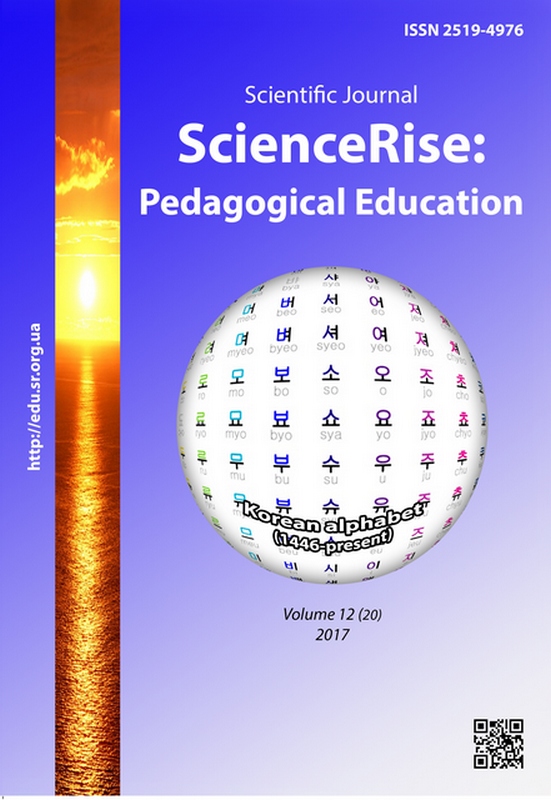Perspectives of developing the idea of agency of a pupil in the humanitarian educational paradigm
DOI:
https://doi.org/10.15587/2519-4984.2017.119947Keywords:
agency, agency development, humanitarianism, humanitarian educational paradigm, humanitarian way of cognitionAbstract
The article analyzes approaches to implementing the agent nature of pupil within the humanitarian educational paradigm. The author points out the relations between humanist and humanitarian education paradigms in views on the agency of the pupil’s personality in the educational process. At the same time it is stated that a humanitarian approach is focused on a new vision of educational activity – a humanitarian way of organizing the process of cognition. The author highlights the need for a new perspective on educational activities based on the principle of humanitarianism which ensures shaping pupils’ personal world view based on a shift in the approach to knowledge acquisition. It is specified that in such conditions agency is manifested in working out one’s own meanings, shaping one’s own world view, motivational and value regulations based on the perception of information that is acquired as personal and meaningful one
References
- Kolesnikova, I. A. (1995). Pedagogicheskie tsivilizatsii i ikh paradigmy [Pedagogical civilizations and their paradigms]. Pedagogy, 6, 43–48.
- Nikitin, V. A. (2008). Sotsiokul'turnyye izmeneniya, opredelyayushchiye novyye zadachi issledovaniya obrazovaniya [Sociocultural changes that determine the new tasks of the study of education]. Available at: http://www.fondgp.ru/lib/chteniya/xiv/mat/22
- Arkhipova, O. V. (2011). Gumanitarnoye obrazovaniye i gumanitarnaya pedagogika: priroda, spetsifika, tseli [Humanitarian education and humanitarian pedagogy: nature, specifics, purpose]. Society. Environment. Development (Terra Humana), 2, 192–195.
- Zhuravleva, O. N. (2013). Didakticheskaya kontseptsiya gumanitarizatsii soderzhaniya sovremennogo shkol'nogo uchenika [The didactic concept of the humanitarization of the contents of a modern school textbook]. Saint Petersburg, 48.
- Slobodchikov, V. I. (1999). Paradigmy razvitiya psikhologii i obrazovaniya [Paradigms of development of psychology and education]. Psikhologicheskoe obrazovanie: konteksty razvitiya, 3, 120–145. Available at: http://charko.narod.ru/tekst/alm3/slob.html
- Makarchuk, I. O. (2011). Refleksyvnyy potentsial osvitnʹoyi paradyhmy [Reflexive potential of educational paradigm]. Bulletin of the NTUU «KPI». Philosophy. Psychology. Pedagogy, 2, 77–80.
- Derzhavna natsionalʹna prohrama «Osvita» (Ukrayina XXI stolittya) [State National Program «Education» (Ukraine XXI Century)]. Ukrainska pedahohika. Available at: http://ukped.com/statti/zakoni-z-pitan-osviti/111-.html?showall=&start=4
- Kontseptsiya zahalʹnoyi serednʹoyi osvity (12-richna shkola) [Concept of General Secondary Education (12-year school)] (2001). Postanova spilnoho zasidannia kolehii Ministerstva osvity i nauky y Prezydii APN Ukrainy, No. 12/5-2. Available at: http://osvita.ua/legislation/Ser_osv/2712/?list=2
- Pro Natsionalnu doktrynu rozvytku osvity [About the National Doctrine of Education Development] (2002). Ukaz Prezydenta Ukrainy, No. 347. Available at: http://zakon0.rada.gov.ua/laws/show/347/2002
- Natsionalʹna stratehiya rozvytku osvity v Ukrayini na period do 2021 roku [National Strategy for the Development of Education in Ukraine until the year 2021] (2013). Ukaz Prezydenta Ukrainy, No. 344. Available at: http://zakon3.rada.gov.ua/laws/show/344/2013#n10
- Nova ukrayinsʹka shkola: Kontseptualʹni zasady reformuvannya serednʹoyi shkoly [New Ukrainian School: Conceptual Principles for Reforming the Secondary School] (2016). MON Ukrainy, 10. Available at: http://mon.gov.ua/202016/12/05/konczepcziya
- Solovtsova, I. A. Spetsifika gumanitarno-tselostnogo pokhoda v issledovanii pedagogicheskikh yavleniy i protsessov [Specificity of the humanitarian-holistic approach in the study of pedagogical phenomena and processes]. Available at: https://subscribe.ru/archive/science.humanity.laboratory/200711/06070816.html
Downloads
Published
How to Cite
Issue
Section
License
Copyright (c) 2017 Olena Halian

This work is licensed under a Creative Commons Attribution 4.0 International License.
Our journal abides by the Creative Commons CC BY copyright rights and permissions for open access journals.
Authors, who are published in this journal, agree to the following conditions:
1. The authors reserve the right to authorship of the work and pass the first publication right of this work to the journal under the terms of a Creative Commons CC BY, which allows others to freely distribute the published research with the obligatory reference to the authors of the original work and the first publication of the work in this journal.
2. The authors have the right to conclude separate supplement agreements that relate to non-exclusive work distribution in the form in which it has been published by the journal (for example, to upload the work to the online storage of the journal or publish it as part of a monograph), provided that the reference to the first publication of the work in this journal is included.








